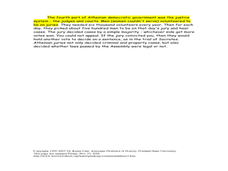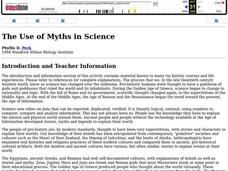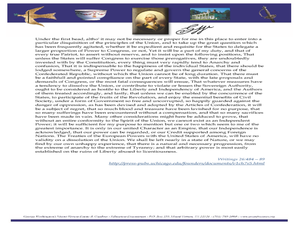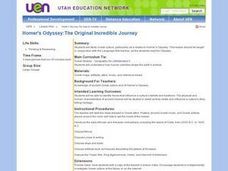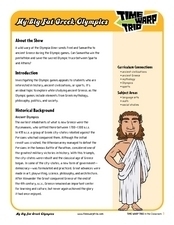Curated OER
Parthenon
Ninth graders explore he purposes of the Parthenon. For this World History lesson, 9th graders create a complete picture of the Parthenon. Students research one aspect of the structure and report their findings back to the...
Curated OER
Democracy: An Introduction.
Learners study the U.S. Constitutional System and how it compares with forms of democracy that developed in ancient Greece and Rome. They list and explain the requirements it takes to form a society to be considered a nation.
Curated OER
Renaiisance In Ancient Egypt
Eleventh graders conduct research about the development of technologies in Ancient Egypt. The research is used to make class presentations. The students work with the teacher in order to create a rubric for the assignment.
Curated OER
To Be or Not to Be Democratic
Seventh graders explore the democratic republic principles of U.S. government. For this U.S. government lesson, 7th graders compare and contrast the governments of ancient Athens,the Roman Republic, and the United States today. Students...
Curated OER
The Greek Gods
What were the early Greek myths? Have elementary students examine the Persian Wars and read various Greek myth in order to identify the cause and the results of the Persian Wars. Myths, activities, simulations, and a unit plan are links...
Curated OER
Guidelines for Governing: Utopia and The Prince
Students explore the power of the Church in government. In this literature lesson, students read Sir Thomas More's Utopia and Niccolo Machiavelli's The Prince. Students respond to questions regarding the works and discuss them.
Curated OER
Sparta and Athens
Sixth graders study Ancient Greece. For this Ancient Greece lesson, 6th graders complete 16 lessons to learn about Ancient Greece. Students complete a quiz for assessment.
Curated OER
Architecture and Democracy
Fifth graders contrast and compare ancient Greece to the U.S.A. In this Greek History activity, 5th graders investigate the buildings and designs of ancient Greece, as well as their democracy and government. Students answer...
Curated OER
Greek Culture And Aesop's Fables
Pupils investigate Aesop's Fables and how they influenced the culture of Ancient Greece. They research five different fables and reflect upon the morals of the stories and state how they influenced the practices of the Greek in writing.
Curated OER
The Use of Myths in Science
Learners are told stories, myths and legend to explain their world. After telling the tales and discussion them, students are assigned to write a myth that describes a familiar situation, such as why the school garbage cans are always...
Curated OER
The Use of Myths in Science
Students examine folk tales to determine the basis for scientific myths. They demonstrate through the discussion of the folk tales that the perception of the world has changed as new information is gained. They write their own folk...
Curated OER
Getting to Democracy
Students define democracy and analyze the conditions needed for democracy to flourish. Students research governments in the Middle East to determine how and if they have any form of democracy within their government.
Curated OER
George Washington & the Classics
Students will compare and contrast famous philosophers with George Washington. In this history lesson, students work in small groups to define Classicism, Legalism, Democracy, Republic and Civility, then read some short excerpts so...
Curated OER
Phiolosophy and Politics
Students study about Aristotle, Plato, and Socrates and how their role affected the Greek culture. They look at a video clip from Bill and Ted's Excellent Adventure and note similarities and differences from the movie and what is in...
Curated OER
Homer's Odyssey:The Original Incredible Journey
Students study Greek culture, particularly as it relates to Homer's Odyssey. They examine how human activities shape the earth's surface and identify forces that influence a culture's beliefs and traditions. They determine that...
Curated OER
An Ancient Greek and Roman Festival
Third graders label a map of ancient Greek and Roman civilizations and do a written report on one element of these two cultures. They participate in discussions of food, farming, daily life and government (among others). Students use the...
Time Warp Trio
My Big Fat Greek Olympics
The Olympic Games are indeed a significant and far-reaching cultural component in our international community today, but from where do they originate? Where do our traditions stem from, and how do we choose the sports that constitute...
Curated OER
Political Traditions
Middle schoolers compare and contrast the political institutions in Greece, Rome, and the United States. In groups, they take this information to determine the influences on James Madison when organizing the republic. They develop a...
Curated OER
The History of Money
In this social studies worksheet, students investigate the history of paper money and coins. Students read paragraphs about what early people used for money and what kinds of banks were used. Students complete a crossword puzzle.
Curated OER
Ancient Cultures - Greek
Students examine the culture of the Greek with a focus on how they decorated their homes. As a class, they watch a PowerPoint presentation and complete an outline. To end the lesson, they draw their own sketch of a Greek chair using...
Curated OER
social Studies: Yesterday, Today, and Tomorow
Sixth graders take an Internet trip back in time to explore ancient cultures. Working in teams, they assume the roles of theologian, cartographer, economist, political analyst, and anthropologist. The same groups then create time...
Curated OER
Comparing Sparta and Athens
Students are taught the differences between totalitarianism and democracy. They discuss the historical roots of the democratic tradition. Students are introduced to the term totalitarianism and are told that it is a form of government...
Curated OER
Who are American Citizens?
Students investigate American citizenship. In this civics lesson, students consider the basic knowledge of U. S. government new citizens are required to have. Students also examine the 14th amendment that describes U. S. citizenship.
Curated OER
Scientific and Cultural Advancements of Early China
Seventh graders explore early Chinese civilization. As pupils study Chinese history, they examine its scientific accomplishments. In partners, 7th graders create an advertisement presentation for an advancement of ancient China.









